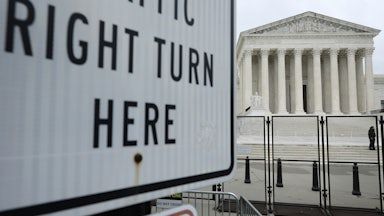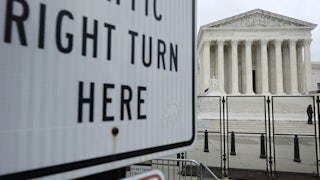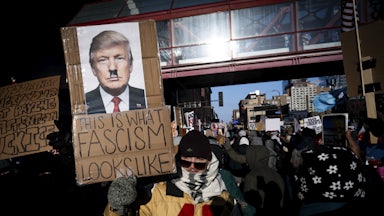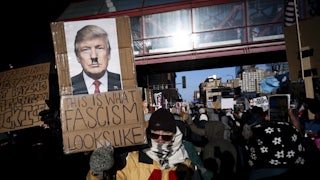If you are a federal agent who enjoys violating the constitutional rights of other people, the Supreme Court gave you some good news on Wednesday. In its ruling in Egbert v. Boule, the court sharply limited the ability of wronged Americans to sue federal law enforcement officials in some civil rights cases. The ruling further narrows a remedy for constitutional violations that has come under attack by conservative justices in recent years. It also builds upon a troubling trend in the Supreme Court’s jurisprudence.
The case centers around Robert Boule, who lives an unusual life. He owns a bed-and-breakfast called the Smuggler’s Inn in Blaine, Washington, which sits on the border between Canada and the United States. Boule’s vehicle, a black SUV, also bears a “SMUGLER” vanity license plate. This is more than just a branding exercise on his part. Boule has a history of smuggling people across the Canadian border, which began in 2000 when he realized his property was a prime conduit to enter the northern frontier. In 2019, a British Columbia court convicted him for helping seven migrants from Afghanistan and Syria clandestinely enter Canada in 2018 and 2019.
Alongside these activities, Boule worked as a paid confidential informant for Immigration and Custom Enforcement, as well as Customs and Border Protection, in the 2000s. His tips helped federal agents make numerous arrests; they reportedly compensated him with more than $60,000 over the years. (Boule did not provide refunds to guests whom he had turned in.) The events that led to his Supreme Court case began in 2014, when Erik Egbert, a CBP agent at the time who was aware of Boule’s informant history, ran into Boule while he was shopping in Blaine. Egbert questioned him about recent and upcoming guests at his inn. Boule told him he had a guest from Turkey on his way to stay there who had flown to Seattle from New York.
According to court records, Egbert grew suspicious of the traveler because he could think of “no legitimate reason a person would travel from Turkey to stay at a run-down bed-and-breakfast on the border in Blaine.” (This is slightly unfair to Blaine, which, among other things, is great for bird-watching.) The agent then shadowed the inn until the guest arrived. Egbert crossed onto Boule’s property, and Boule interposed himself between the guest, who was in a car, and the agent. Egbert then shoved Boule, who was in his midsixties at the time, against the car before physically lifting him up and throwing him to the ground. Boule landed on his shoulder and hip and later sought medical care for his injuries. Each of the men summoned more agents and Egbert’s supervisor. They quickly concluded that the Turkish guest was present in the country lawfully.
“Boule complained to Agent Egbert’s superiors about the incident and filed an administrative claim with CBP, which allegedly prompted Agent Egbert to retaliate against Boule,” Sotomayor recounted in her dissent. “Agent Egbert contacted the Internal Revenue Service (IRS), the Social Security Administration, the Washington State Department of Licensing, and the Whatcom County Assessor’s Office, asking them to investigate Boule’s business. These agencies did so, but none found that Boule had done anything wrong. Boule paid over $5,000 to his accountant to assist him in responding to the IRS’ tax audit.”
Neither the administrative inquiry nor a lawsuit by Boule under the Federal Tort Claims Act went anywhere. While CBP’s probe found that Egbert had not fully cooperated with investigators and that he had “demonstrated lack of integrity” warranting removal, according to Sotomayor’s summary of a redacted brief, he apparently remains a CBP agent. In 2017, Boule filed what is known as a Bivens lawsuit against the agent for allegedly violating Boule’s Fourth Amendment rights during the initial encounter and his First Amendment rights for retaliation after he made the initial administrative complaint. A federal district court ruled against him on both counts, but the Ninth Circuit Court of Appeals reversed it and allowed the two claims to go forward.
What are Bivens claims? Imagine that you’re sitting at home when the doorbell rings. A local police officer comes in, ransacks your home without a search warrant, and arrests you. You get out of jail and go home. While you’re trying to clean up the place, the doorbell rings again. This time an FBI agent comes in, ransacks your home again without a search warrant, and arrests you for something else. After you get out of jail again, you might want to sue each of them for violating your Fourth Amendment rights and get some sort of damages for your troubles.
For your local cop, you can do that under Section 1983, a provision of a Reconstruction-era federal civil rights law. This is the basis for most lawsuits that you read about when someone accuses a state or local official of violating a constitutional right. (Section 1983 has its own problems that we’ll get into later.) But what about the FBI agent? Federal officials aren’t covered by Section 1983, and while Congress has created some causes of action (a legal term that means “basis to sue someone”) in some circumstances, it hasn’t created a similarly broad mechanism to sue federal civil servants for constitutional violations.
The Supreme Court filled this void to some degree in the 1971 case Bivens v. Six Unknown Narcotics Agents. In that case, a man named Webster Bivens sued six members of the Federal Bureau of Narcotics for searching his home without a warrant and arresting him in violation of the Fourth Amendment. The agents tried to get the lawsuit thrown out by arguing that Congress had not created a cause of action to justify it. In a 6–3 ruling led by the liberal justices at the time, the Supreme Court ruled that there was an implicit cause of action in the Fourth Amendment and that Americans could accordingly seek damages under it.
The ruling came on the cusp of the high court’s ideological transition. In the succeeding years, the liberal justices’ power gave way to the ascendancy of the court’s centrist faction in the early 1970s and eventually to the conservative bloc in the 1980s and beyond. During that time the court largely declined to expand Bivens beyond its original scope and, in some instances, sought to narrow it. In some more recent cases, such as Ziglar v. Abbasi and Hernandez v. Mesa, leading conservative justices like Samuel Alito and Clarence Thomas have inched toward getting rid of it altogether, casting Bivens—disingenuously, as some have argued—as a judicial theft of authority that properly belongs with Congress.
All nine justices agreed that Bivens could not be extended to the First Amendment retaliation claim raised by Boule under the court’s existing precedents. The court then split along the usual lines when it came to the Fourth Amendment claim, which is more squarely within what Bivens envisioned. Here too the conservative justices, led by Thomas, concluded that the Ninth Circuit had misread Bivens. “That conclusion was incorrect for two independent reasons: Congress is better positioned to create remedies in the border-security context, and the government already has provided alternative remedies that protect plaintiffs like Boule,” he wrote.
I won’t bother recapping the history of when courts say Bivens should apply because—true to form—it didn’t seem to have mattered to Thomas during his deliberations. He instead reinterpreted the Supreme Court’s previous rulings to say that if there is “any reason” why it would be better for Congress to create a cause of action, then Bivens does not cover it. Thomas also invoked national security reasons to justify not holding Egbert accountable, saying that the courts were ill equipped to scrutinize CBP agents in the border-security context. It’s unclear why CBP agents should be treated differently when the plaintiff is a U.S. citizen and was on U.S. soil at the time; apparently the light of the Constitution dims when it gets too close to Canada.
To make matters worse, Thomas said the courts can’t entertain a Bivens claim if another branch has some sort of process for a wronged individual to invoke. “So long as Congress or the Executive has created a remedial process that it finds sufficient to secure an adequate level of deterrence, the courts cannot second-guess that calibration by superimposing a Bivens remedy,” Thomas concluded. “That is true even if a court independently concludes that the government’s procedures are ‘not as effective as an individual damages remedy.’”
It’s one thing to say that Bivens-like claims are Congress’s responsibility. But Thomas went even further and wrote that it would be enough if the executive branch made up some kind of process of its own. In other words, since CBP has some sort of an administrative review system—one that found Egbert should be fired and then apparently didn’t fire him—the courts could not go any further. This would seem to place wronged individuals in the strange position of seeking a remedy for violation of their constitutional rights from the agency that was just responsible for violating them.
Justice Sonia Sotomayor, writing for the three dissenting liberal justices, criticized Thomas’s reasoning on this front in sharp terms. “By the Court’s logic, however, the existence of any disciplinary framework, even if crafted by the Executive Branch rather than Congress, and even if wholly non-participatory and lacking any judicial review, is sufficient to bar a court from recognizing a Bivens remedy,” she noted. “That reasoning, as disturbing as it is wrong, marks yet another erosion of Bivens’ deterrent function in the law enforcement sphere.”
She also took aim at the conservative justices in general for chipping away at Bivens. “Just five years after circumscribing the standard for allowing Bivens claims to proceed, a restless and newly constituted Court sees fit to refashion the standard anew to foreclose remedies in yet more cases,” she wrote.
Her reference to the “restless and newly constituted court” is somewhat extraordinary because it broke the fourth wall. The polite fiction is that the Supreme Court is a changeless entity even as the individual justices come and go. It’s unusual for a sitting justice to openly acknowledge that the court’s precedents are changing because its membership has changed. Her remark is even more ominous against the backdrop of other cases yet to be decided this term.
While not much is left of Bivens, it still technically remains on the books as a vague shadow of itself. Thomas’s majority opinion noted that Bivens “has had no shortage of detractors,” citing dissenting opinions by past justices (and one by himself), and said the court would not reach the same conclusion today on implied causes of action as it did in 1971. But he also surmised that it was not necessary to overturn Bivens to resolve Boule’s case. Justice Neil Gorsuch wrote a separate concurring opinion where he effectively argued that the court should have finished the job. “In fairness to future litigants and our lower court colleagues, we should not hold out that kind of false hope, and in the process invite still more protracted litigation destined to yield nothing,” he wrote. Even those who disagree with Gorsuch might at least appreciate his relative straightforwardness and candor on the matter.
Wednesday’s ruling only underscores the court’s commitment to closing off pathways for Americans to seek vindication for wrongs committed against them in the federal courts. You may recall that I mentioned Section 1983 earlier when discussing violations of rights by state and local officials. The Supreme Court has also rendered that promise increasingly hollow in recent years with its doctrine of qualified immunity, which often protects cops—other civil servants too, technically, but usually cops—for all but the most obvious violations of rights.
So here’s the state of play: When Congress is silent on a cause of action, as in Bivens, the Supreme Court reads any implied one narrowly to the point of uselessness—and might just scrap it altogether if you somehow succeed. And when Congress actually does create a cause of action like Section 1983 so you can seek remedies when your rights are violated, the Supreme Court sews together a doctrine from scraps of precedents to make it harder, if not impossible, for you to prevail. A Martian who flies to Earth, lands at a law school campus in a flying saucer, and reads the latest rulings could be forgiven for thinking that the justices’ job is to prevent these cases from being filed instead of hearing them.










